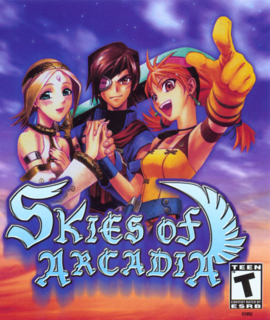Utterly Captivating
Many things mark Arcadia out, but nothing more so than it’s world. The six aforementioned moon crystals, it transpires, are connected to the corresponding moons for each continent and each moon’s inert characteristics provide the aesthetic style for each continent. The great continent of Nasr for example is controlled by the Red moon and is thus an arid and hot desert. Ixa’Taka however is lush with forests and vegetation being controlled by the green moon. This distinction between lands is perfectly pitched and believable which adds immeasurable depth and character to the world. It also adds a good variety of interest, each world feeling fresh and ripe for exploration. This differences also mark out the inhabitants. The people of Nasr are what you’d expect from those living in a desert and they are also distinctly proud of their great civilisation whilst Ixa’takans are almost aboriginal, at one with nature and mistrusting of those pursue wealth and power. It marks an interesting change where inhabitants of each continent are markedly different and it adds a depth of believability and credence to the whole affair.
The characters are what also really make the game work. Vyse, Aika and Fina are all likeable and defer away from each categorisation. Vyse is optimistic, confident and explorative with little more ambition than to see new lands. When he is drawn into the wider story frame and battle for the world it is out of desire to protect his friends and a desire to accomplish the right thing. This moral integrity for the sake of moral integrity is a welcome diversion for characterisation in games. Vyse is good because he is good, there is no need for deeper analysis, he is simply caring and determined to pursue the right course. These traits also exude from Fina and Aika to the same degree. This is not to say the characters are in any way one-dimensional, far-from. Although Vyse, Fina and Aika are intrinsically good they are forced to face certain dilemmas over their character throughout the game, yet their difficulties are made all the more poignant because you are forced to concede caring to these inherently good people. This scope for characterisation is carried into the secondary characters and the enemy even more emotively. Drachma, an old Moby Dick style character (the game has a gently affinity for soft parody) seems cold and inert initially, totally focused on catching the arc whale Rhaknam. Yet as the game progresses it becomes apparent that he holds Rhaknam responsible for the death of his son hence his desire for revenge. The scene of this confession to Vyse is one of the more powerful examples of emotive appeal in games. Similarly this trait of deep characterisation carries powerfully over into the opponents you face. No character in the game seems one-dimensional in any form and no character is type-cast. Belleza, an admiral of the Valuan Armada initially seems a typical enemy, but it becomes clear through time that she carries a painful past and her desire to see Valua rule the world is out of a desire for the world to be united and peaceful. As the game progresses she faces harsh moral dilemmas and although you never get to actually play as her in any way, she is perhaps the character who provides the most personal connection to the gamer. Gregorio, another admiral, it is eventually revealed is related to one of the main characters and he too must face difficult decisions over his future and the path he chooses. This desire to do good, even from the opposing forces, adds a level of depth and tangibility very rarely seen in games. If art imitates life Arcadia’s accurate and real imitation of the decisions we all must go through in life, and the notion that people striving for the same goal came come into opposition, allows the game to rightfully lay claim to some artistic credibility. What makes Arcadia even more startling is that the game never openly morally questions or never goes down the path of complex analysis; rather it gently provides us with an imitation of life and asks us to make the conclusions. It’s themes aren’t forced but merely presented and it shies away from going down the path’s well trodden by the Final Fantasy’s. In this sense it could be argued that Arcadia is far cleverer and more intelligent than any of it’s brethren. Even at the times of it’s most powerful and darkest portrayals, the game feels light-hearted and this is a stunning achievement that Overworks can rightly be immensely proud of. Indeed it is only on a second play-through of the game that it’s complexities and genuinely deep emotional power comes to fore and can be properly analysed. It touches you gently without you ever realising what’s happening. This use of gentle power is most evident when it comes to Valua. Valua is the great power of the world, and the ones seeking the moon crystals to control the Gigas (huge creatures of immense power created by the old world inhabitants). Yet even Valua in itself has depth. The empire rightly or wrongly believes that it’s actions are best for the world and comparisons can readily be drawn with modern day America. The continent itself is split into two, on one side slums and poverty are rife whilst the other is affluent and rich. When you initially walk through the slums of poor Valua it is remarkably touching and true to life and it helps bring the game much character.
Skies of Arcadia is a game that captures the imagination and stands as a reflection of how games can have true emotional depth way beyond the disparate and sometimes simplistic gaming elements. The basic 3-D turn based fighting system, and simplistic, but utterly whole and compelling character and world design, conceal a game of incredible depth, skill and complexity, whose emotionally subtle and innocent core will remain untouched throughout gaming history.

